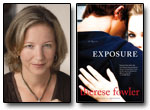Therese Fowler's third novel, Exposure, is a modern drama that touches on relevant societal issues. Sexting is at the heart of this book, as two teens, helplessly in love, become "exposed" when 18-year-old Anthony sends naked photos of himself to 17-year-old Amelia, whose strict father immediately has him arrested. In this interview, Fowler discusses the close-to-home seed for the plotline --- her very own son, who found himself in a similar situation --- revealing how, amid her horror and frustration, this story took immediate precedence over the one she had been writing. She also expresses her hope that Exposure will endow readers with a better sense of the technological, high-pressure world in which today's teens live.
 Question: Exposure is fiction, but was inspired by your son's arrest for what's become known as a "sexting" crime. Can you tell us about that?
Question: Exposure is fiction, but was inspired by your son's arrest for what's become known as a "sexting" crime. Can you tell us about that?
Therese Fowler: I was working on a different book when my son, who had just turned 19, told me that a warrant was being issued for his arrest. He'd shared a photo of himself undressed with a girl who'd asked him to send one, and when her father discovered it he called the police. Because my son was over 18 and the girl was not, he was charged with the crime that one of Exposure's characters, Anthony, is charged with initially: disseminating harmful materials to a minor.
Life for my son and our family became very complicated very quickly, but I felt bound to keep working on that other book and meet my deadline. However, the story just wasn't doing quite what I wanted it to do, and I was worried that it might be somehow fatally flawed.
In the meantime, the idea for Exposure was taking root. I'm sure it grew from my horror and frustration with what was going on, and the effects it had on my son and on our family. I asked him what he thought about my writing a novel inspired by the situation (but completely fictional), and he was fully supportive. I wouldn't have considered it otherwise. Since he was supportive, I wrote the story outline and took it to my editor and publisher, who gave me their support as well.
Q: A lot of people would rather put a troubling time behind them, yet in writing a novel based on your troubles you chose to do the opposite. Why?
TF: The subject of teens and sexuality and technology and the law is a fascinating, complex issue, and one I struggled with while my son's case was ongoing. Where should we place the blame when kids get into trouble for sexting? What's appropriate in terms of punishment?
I'm a novelist, so maybe I'm predisposed to want to explore such questions in story terms. But I also felt obligated; as I researched the issue, I came across many disturbing news stories about these issues and the consequences for everyone involved. If my crafting a cautionary tale could help prevent even one new crisis, wasn't it my duty to try? It didn't feel like a choice.
Q: Did you know from the outset that the book would get published?
TF: No; in fact the whole time I was working on it I was terrified that I'd made a mistake in abandoning the other book. Yes, I had my publisher's blessing to substitute this story for that one, but I still had to meet a deadline and, as is true with any book an author writes under contract, the final product has to pass muster or it doesn't get published and the author doesn't get paid.
Fortunately, I met my deadline, and everyone involved was not only satisfied with but also quite enthusiastic about the manuscript.
Q: Early book reviews from people as diverse as public school administrators, booksellers, and regular readers are saying Exposure is a must-read for all teens, parents of teens, and adults who care for or work with teens. This sounds like educational advice; isn't fiction supposed to be read for enjoyment?
TF: Absolutely --- but that doesn't mean there isn't also something of value to be gained from the reading. Whether invented or true, stories have been the vehicles of lessons and warnings and inspiration for as long as humans have had the means to tell them. My philosophy about and my purpose with my all of my novels is to tell an engaging story, and to tell it about something that matters.
Q: What do you hope people will take away most from this book?
TF: With Exposure, I hope teen readers will gain insights that help them protect themselves and make good decisions. It's difficult to be a teen today; there are so many messages, so many influences, so many temptations. It's equally difficult to be a parent or educator or counselor, trying to understand and shape kids' environments in ways that acknowledge all the challenges. I hope adult readers will gain some additional understanding of this strange new world, and take reasonable action to help children avoid trouble.
Q: What's next for you?
TF: I'm at work on my fourth novel, which, like Exposure, is a contemporary drama that also looks at societal issues. Two very close families, a tragedy in which underage drinking plays a role, questions of loyalty, questions of guilt --- who, or what, is really to blame? And what will happen when the truth is revealed? It's scheduled for publication sometime next year.
© Copyright 2011, Ballantine Books, an imprint of Random House, Inc. All rights reserved.
Blog
May 10, 2011
An Interview with Therese Fowler, Author of EXPOSURE
Comments

